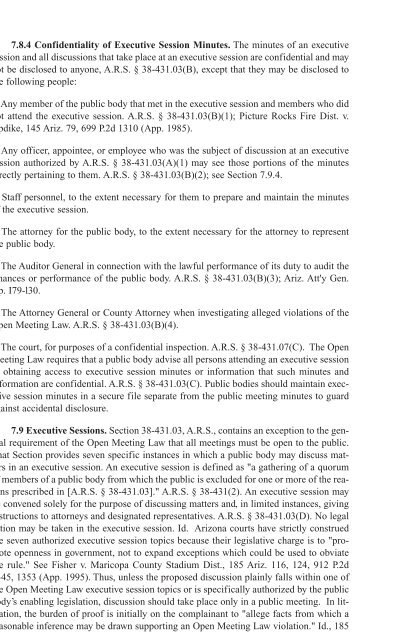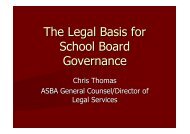The Arizona Open Meeting Law - Arizona School Boards Association
The Arizona Open Meeting Law - Arizona School Boards Association
The Arizona Open Meeting Law - Arizona School Boards Association
You also want an ePaper? Increase the reach of your titles
YUMPU automatically turns print PDFs into web optimized ePapers that Google loves.
7.8.4 Confidentiality of Executive Session Minutes. <strong>The</strong> minutes of an executive<br />
session and all discussions that take place at an executive session are confidential and may<br />
not be disclosed to anyone, A.R.S. § 38-431.03(B), except that they may be disclosed to<br />
the following people:<br />
1. Any member of the public body that met in the executive session and members who did<br />
not attend the executive session. A.R.S. § 38-431.03(B)(1); Picture Rocks Fire Dist. v.<br />
Updike, 145 Ariz. 79, 699 P.2d 1310 (App. 1985).<br />
2. Any officer, appointee, or employee who was the subject of discussion at an executive<br />
session authorized by A.R.S. § 38-431.03(A)(1) may see those portions of the minutes<br />
directly pertaining to them. A.R.S. § 38-431.03(B)(2); see Section 7.9.4.<br />
3. Staff personnel, to the extent necessary for them to prepare and maintain the minutes<br />
of the executive session.<br />
4. <strong>The</strong> attorney for the public body, to the extent necessary for the attorney to represent<br />
the public body.<br />
5. <strong>The</strong> Auditor General in connection with the lawful performance of its duty to audit the<br />
finances or performance of the public body. A.R.S. § 38-431.03(B)(3); Ariz. Att'y Gen.<br />
Op. I79-l30.<br />
6. <strong>The</strong> Attorney General or County Attorney when investigating alleged violations of the<br />
<strong>Open</strong> <strong>Meeting</strong> <strong>Law</strong>. A.R.S. § 38-431.03(B)(4).<br />
7. <strong>The</strong> court, for purposes of a confidential inspection. A.R.S. § 38-431.07(C). <strong>The</strong> <strong>Open</strong><br />
<strong>Meeting</strong> <strong>Law</strong> requires that a public body advise all persons attending an executive session<br />
or obtaining access to executive session minutes or information that such minutes and<br />
information are confidential. A.R.S. § 38-431.03(C). Public bodies should maintain executive<br />
session minutes in a secure file separate from the public meeting minutes to guard<br />
against accidental disclosure.<br />
7.9 Executive Sessions. Section 38-431.03, A.R.S., contains an exception to the general<br />
requirement of the <strong>Open</strong> <strong>Meeting</strong> <strong>Law</strong> that all meetings must be open to the public.<br />
That Section provides seven specific instances in which a public body may discuss matters<br />
in an executive session. An executive session is defined as "a gathering of a quorum<br />
of members of a public body from which the public is excluded for one or more of the reasons<br />
prescribed in [A.R.S. § 38-431.03]." A.R.S. § 38-431(2). An executive session may<br />
be convened solely for the purpose of discussing matters and, in limited instances, giving<br />
instructions to attorneys and designated representatives. A.R.S. § 38-431.03(D). No legal<br />
action may be taken in the executive session. Id. <strong>Arizona</strong> courts have strictly construed<br />
the seven authorized executive session topics because their legislative charge is to "promote<br />
openness in government, not to expand exceptions which could be used to obviate<br />
the rule." See Fisher v. Maricopa County Stadium Dist., 185 Ariz. 116, 124, 912 P.2d<br />
1345, 1353 (App. 1995). Thus, unless the proposed discussion plainly falls within one of<br />
the <strong>Open</strong> <strong>Meeting</strong> <strong>Law</strong> executive session topics or is specifically authorized by the public<br />
body’s enabling legislation, discussion should take place only in a public meeting. In litigation,<br />
the burden of proof is initially on the complainant to "allege facts from which a<br />
reasonable inference may be drawn supporting an <strong>Open</strong> <strong>Meeting</strong> <strong>Law</strong> violation." Id., 185<br />
- 32 -



